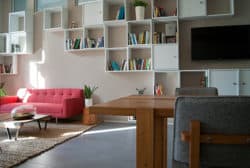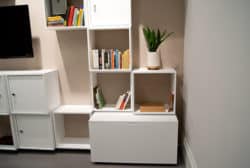
Justin Lacey and Miriam Devlin, co-owners of Day Shift Furniture, assemble one of the 34 boxes that make up the Carnegie Mellon shelving. Photo Credit Miriam Devlin.

The Bullitt Center’s many sustainable features include cabinets made from Columbia Forest Products formaldehyde-free PureBond Plywood. Photo Credit Nic Lehoux
The Seattle-based Bullitt Foundation, led by the original Earth Day organizer Denis Hayes, set out to inspire a revolution of environmental construction, including the use of non-toxic materials. Billed as the “greenest commercial building in the world”, the Bullitt Center is the first office building to earn the International Living Future Institute’s (ILFI) Living Building certification.
Cabinets made from plywood that uses soy in the assembly technology helped the building avoid formaldehyde, one of the ILFI’s 14 “Red List” toxic substances banned from interiors of their approved buildings. The Bullitt Center has pullman kitchens on each floor. The cabinets in those kitchens are made from Columbia Forest Products’ formaldehyde-free Purebond® plywood.
The Bullitt Center is a 52,000 square-foot, six-story, market-rate, office building with commercial tenants. Living Building certification standards measure its sustainability. In addition to meeting a rigorous prerequisite for only using wood certified to Forest Stewardship Council (FSC) standards, the Bullitt Center builders also screened out toxic materials from building materials used inside the structure, including added formaldehyde. For its strict indoor air quality requirements, the Living Building certification at the time listed 14 substances it considered under its banned “Red List”. Added formaldehyde was one of those 14 substances as it related to interior plywood; no sheet goods used inside the weather barrier contained added formaldehyde.
Carnegie Mellon’s Showcase

Photo Credit Miriam Devlin
Carnegie Mellon University’s (CMU) School of Design needed a showcase room to receive esteemed visitors as well as deliver comfort and durability to daily users.
A CMU alumni crafted the design solution featuring American hardwood plywood shelves and boxes made with a well-proven soy-based assembly technology which replaced formaldehyde-based glues. The design met CMU’s goals for functionality. At the same time, the choice benefits the employees and guests who work and visit the 19’ X 27’ space completed in 2011.
Working step-by-step with the CMU’s design school staff and instructors, Day Shift Furniture developed an overall plan and design for the room as well as individual pieces of furniture. Day Shift is a Pittsburg company founded by Miriam Devlin and CMU alumni Justin Lacey to design and build sustainable furniture. While at CMU, Industrie Forum Design honored Justin’s work with an IF Concept Award.
“We work to make useful, durable pieces with clean and modern forms using socially conscious, environmentally responsible, design and production processes,” said Devlin,
“We think it’s an interesting endeavor to come up with good ideas about forms, materials, and places of habitation, and then engage in the process of building them,” Devlin adds.
“Instead of standard static shelves, we were struck by a better idea,” said Lacey. “We came up with a concept of shelf boxes or ‘pixels’ rather than rigid shelves. They needed to be able to place them in an easily repeatable manner as there were 34 of them in the final composition.”
Day Shift spray finished CMU’s boxes with bright white, low-VOC, high-gloss mineral/latex enamel paint. They mounted the boxes with a specially designed system, which was tested to hold more than 125 pounds each.
To maximize book storage, the shelving boxes span the length of one entire wall. The shelving helps define the spaces, without requiring physical dividers. It unifies the sides and functions of the room. Some of the boxes had doors to store various supplies, such as audio visual equipment and dishes.
Soy Inside But No Added Formaldehyde

Miriam Devlin’s solution to shelving was an innovative series of boxes made from Columbia Forest Products’ PureBond plywood. The well-proven assembly technology uses soy instead of formaldehyde-based glues. Photo Credit Miriam Devlin.
Day Shift constructed the boxes from PureBond® — a domestically-produced hardwood plywood from Columbia Forest Products where panels are bonded with soy protein. In 2005, Columbia Forest Products started manufacturing hardwood plywood using an innovative soy protein process to assemble panels, replacing urea formaldehyde.
The U.S. Environmental Protection Agency (EPA) honored the researchers who developed this new soy-based panel assembly approach with the 2007 Presidential Green Chemistry Award. According to the EPA, the technology represented the “first cost-competitive, environmentally friendly adhesive that replaced the toxic urea–formaldehyde (UF) resin.” Since its full conversion to PureBond assembly in 2006, Columbia has now manufactured more than 50 million sheets, eliminating more than 300,000 tons of UF resins and the formaldehyde exposure risk to its employees, supply chain partners and customers downstream.
The technology also represented a new use for soy. U.S farmers grow more than 70 million acres of U.S. soybean plants each year, offering an abundant and renewable supply of ingredients for food and livestock feed as well as industrial products such as soy-based adhesives.
According to U.S. Department of Agriculture (USDA) data, about 600,000 U.S family farmers grow soybeans on the rough equivalent of 60 million football fields. Each year, those soybeans remove the carbon equivalent of taking 21 million cars off the road.
Federal law, the Federal Acquisition Regulation, and Presidential Executive Orders direct federal agencies and their contractors to purchase biobased products in categories identified by USDA. PureBond qualifies for mandatory federal purchasing because it meets the requirements of the USDA-designated biobased category for composite panels.

The boxes at the Carnegie-Mellon Design School meeting center serve several functions ranging from book storage to kitchen supplies. Photo Credit Miriam Devlin.
According to Columbia Forest Products, the plywood decorative panels are compliant with the U.S. Green Building Council’s Leadership in Energy and Environmental Design (LEED 2009) standard, earning one point for LEED’s EQ Credit 4.4 for Low-Emitting Materials: Composite Wood. PureBond decorative interior panels also satisfy the emissions standards of the California Air Resources Board (CARB) Phase 2 regulations, which will also be called for by the new LEED V4 when LEED 2009 sunsets in 2016. Upon request, PureBond products can also be supplied with Forest Stewardship Council® (FSC®) certification.
For other examples of the use of the soy protein in building products, click here.
Columbia Forest Products PureBond decorative hardwood plywood panels are used to make cabinets, furniture, and a variety of other wooden fixtures in residential and commercial settings. PureBond panels are available with the industry’s widest array of species, thicknesses and value-added treatments from Columbia’s wholesale distributor network as well as at retail outlets like the Home Depot. Fabricated products are available through a variety of companies, including those participating in Columbia PureBond® Fabricator Network.
For more information about the Bullitt Center, go to www.bullittcenter.org or contact Brad Kahn b.kahn@us.fsc.org at 206-419-1607,
For more information about the CMU project, go to http://www.dayshiftfurniture.com/ or contact Miriam Devlin miriam@dayshiftfurniture.com or at 412-342-8426
For more information about Columbia Forest Products, go to http://www.columbiaforestproducts.com/product/purebond-classic-core/ or contact Paul Davis at Pdavis@cfpwood.com or 503-243-7311.
